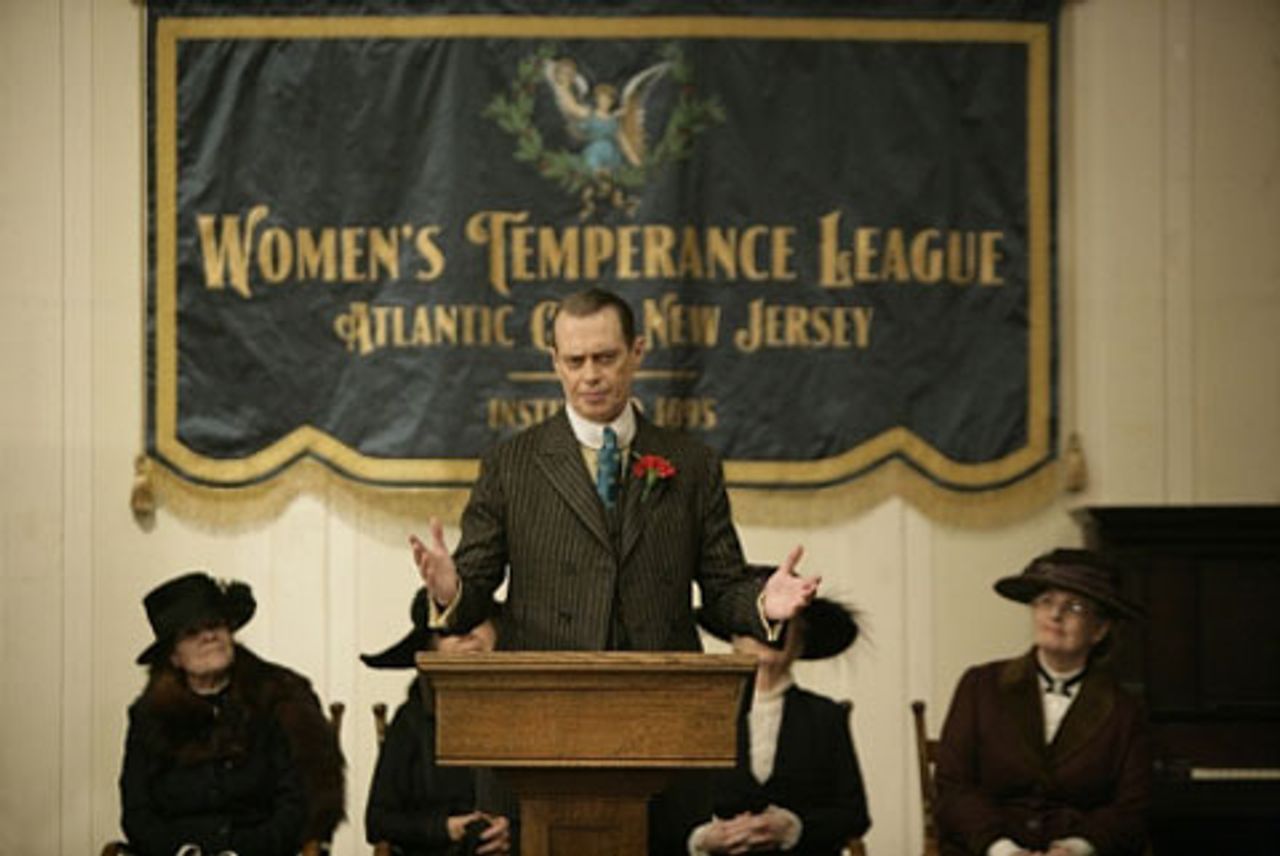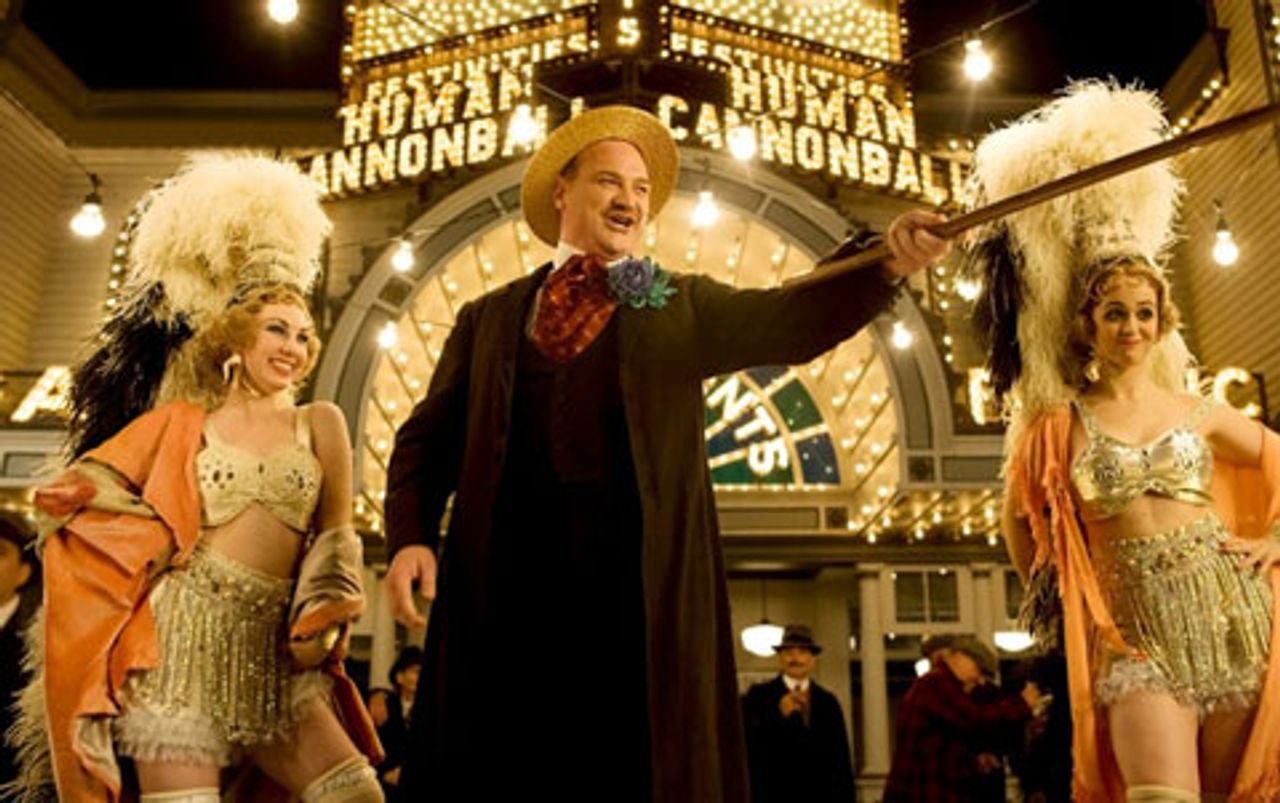Television series directed by Martin Scorsese and others, written by Terence Winter, adapted from a book by Nelson Johnson
 Boardwalk Empire
Boardwalk EmpireHBO’s Boardwalk Empire, whose first episode was directed by Martin Scorsese and on which the latter serves as executive producer, has delivered a mostly disappointing first season. Several of the women actors create complex, credible characters; the male actors have their moments, but for the most part they seem stuck with stereotypes from crime films of recent decades.
In fact, the series suffers centrally from Scorsese’s perennial tendency to pay homage to gangsters and gangster films, with all of the stylized violence and clichéd figures normally associated with the genre.
Moreover, in keeping with that impressionistic bent, the series makers insist on treating the source of the characters’ problems as exclusively psychological—although the program takes place in the volatile 1920s, in an America undergoing all manner of profound change. In this, they follow in a recent (and tedious) tradition that has seriously limited the scope and critical perspective of many contemporary movies and television series.
Boardwalk Empire revolves around the life and personality of Enoch “Nucky” Thompson, played by Steve Buscemi (and based on the historical figure of Enoch Lewis Johnson). Thompson uses his office as county treasurer and other positions in Atlantic City, New Jersey—a famed seaside resort not far from Philadelphia and New York City—to create an empire during the Prohibition Era (1919-33). The economic rewards of making and distributing alcohol—a black gang, led by Chalky White (Michael K. Williams, of The Wire fame), dilutes the booze for Thompson—allow the staunchly Republican official to gain political prominence.
Thompson begins by shuffling people—including his brother, Eli (Shea Whigham)—in and out of political positions in response to the needs of his growing enterprise. In later episodes, Thompson’s reach extends to the presidency of the United States as he plays a critical behind-the-scenes role in elevating Warren G. Harding to power in 1920.
 Boardwalk Empire
Boardwalk EmpireThompson experiences various dilemmas in his “business” and personal life. His empire is threatened by the efforts of a religious zealot, federal Prohibition agent Nelson Van Alden (Michael Shannon). He also faces a New York gang, led by Arnold Rothstein (Michael Stuhlbarg) and his associates Charles “Lucky” Luciano (Vincent Piazza) and Meyer Lansky (Anatol Yusef), whose failed attempt at taking over the empire results in a business partnership. Nucky’s close, personal relationships with his young protégé Jimmy Darmody (Michael Pitt) and mistress, Margaret Schroeder (Kelly Macdonald), reveal his Dr. Jekyll and Mr. Hyde personality.
The generally excellent Kelly Macdonald (No Country for Old Men, Gosford Park, Trainspotting) gives one of the most memorable performances as Margaret Schroeder, also one of the most demanding roles. She succeeds in representing her character’s transformation from a smart yet naïve, idealistic young immigrant to a wary, sometimes cynical woman.
This change occurs as her relationship with Nucky Thompson deepens (he “keeps” her in a house inhabited by the concubines of various corrupt figures in Atlantic City) and she begins to see that his generosity to others, including herself, only comes with strings attached. Her physical and facial responses to Nucky’s duplicity are particularly convincing, and it is to Ms. MacDonald’s credit that her character insists on being understood instead of judged.
Aleksa Palladino as Angela Darmody (Jimmy Darmody’s common-in-law wife and mother of his young son), Gretchen Mol as Gillian Darmody (Jimmy’s mother), and Paz de la Huerta as Nucky’s mistress, Lucy Danziger, are also effective at registering their characters as little more than accessories to their gangster partners and the world they inhabit.
When Steve Buscemi portrays his character’s “Dr. Jekyll side,” he proves capable of stepping outside himself and generating honest, human emotion during scenes of private difficulty. But when assuming his character’s Mr. Hyde or “business” guise (who shows up for most of the series), the actor either recreates his persona from earlier roles or simply looks lost when called on to play the trite “tough boss” role.
As James “Jimmy” Darmody, Michael Pitt is also more interesting and believable when asked to express his character’s more sensitive side, especially in scenes involving his family. Pitt’s Darmody also competently carries out Nucky Thompson’s dirty work, but at such moments the actor is not asked to do much more than give us the hot-tempered, impatient thug we come to expect from recent violent crime films and television shows. Such performances are not so much based on life as on other performances.
Other characters too are drawn from what has become the fashionable manual for gangster movies. Stephan Graham plays Al Capone as a clownish caricature of the historical figure. Michael Shannon turns Nelson Van Alden, the federal agent who makes a one-man crusade out of taking down Nucky Thompson, into a grotesque distortion of the detestable J. Edgar Hoover, upon whom the character is based. The contemporary cinema’s ahistorical perspective is apparently at work here: the director/writer/actors have chosen to ignore Ezra Pound’s advice to artists: “the perfect symbol is the natural object.”
Boardwalk Empire’s most enfeebling debt to current American filmmaking lies in its insistence that the characters’ various problems and failings have purely individual psychic origins.
The only clue offered as to Nucky Thompson’s split personality and problem with “committing to women” is a distant, abusive father. At one point, Jimmy Darmody tells Nucky that the First World War turned him into a “murderer,” but he spends most of his time either acting out rage toward or looking for his own absent father. Margaret Schroeder’s ambitions are frustrated by her status as an immigrant woman, but her eventual submission to Nucky and his empire are presented as expressions of her need for a father figure. This is all rather banal.
There are suggestions of a world outside Nucky’s empire and personal sphere: his influence with the ill-fated Harding will bring a paved road to Atlantic City; the League of Nations is mentioned; and a character reads a newspaper account of a woman who claims to be the Anastasia, the daughter of the Russian tsar, executed by the Bolsheviks. Not much else. Boardwalk Empire contains several good performances, but it’s far too much of a gangster series about gangster movies to add up to a larger idea.
